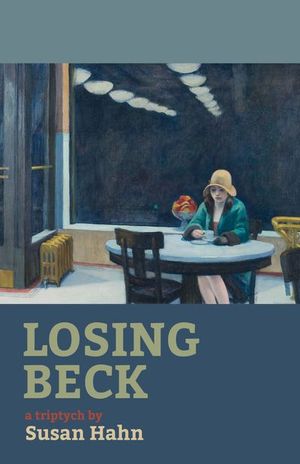Losing Beck
Published by Red Hen Press
A young poet’s relationship with a predatory professor is explored through a diary, a play, and a novella dealing with themes of grief, trauma, and desire.
Jennie Silver has been seduced, abused, and abandoned by Benedict Eck, a Midwestern literature professor known for being influenced by Hungarian émigré novelist Avigdor Element, and a notorious womanizer known for preying on vulnerable graduate students. In the process, Jennie keeps a diary and writes a play and a novella in her attempt to control her desperate, high-pitched emotions focused on a man she is uncontrollably drawn to and at the same time finds repugnant—a man who is one of the keepers and part of the legacy of Element’s bad behavior.
Spanning a hundred years of history from when Nijinsky danced “The Afternoon of the Faun” in Paris in 1912, through World Wars I and II, to very close to the present, Losing Beck is not only a portrait of one woman’s relationship with one man, but an exploration of obsession, grief, desire, and the effects of historical trauma.
“This triptych of narratives contains a plenitude of characters driven by overpowering emotions and dark motives . . . I was especially fascinated by the meticulous scrutiny of family relations, especially mother-daughter attachments, often dramatized against a backdrop of twentieth-century Jewish history.” —Laurence Goldstein, author of The American Poet at the Movies: A Critical History
Jennie Silver has been seduced, abused, and abandoned by Benedict Eck, a Midwestern literature professor known for being influenced by Hungarian émigré novelist Avigdor Element, and a notorious womanizer known for preying on vulnerable graduate students. In the process, Jennie keeps a diary and writes a play and a novella in her attempt to control her desperate, high-pitched emotions focused on a man she is uncontrollably drawn to and at the same time finds repugnant—a man who is one of the keepers and part of the legacy of Element’s bad behavior.
Spanning a hundred years of history from when Nijinsky danced “The Afternoon of the Faun” in Paris in 1912, through World Wars I and II, to very close to the present, Losing Beck is not only a portrait of one woman’s relationship with one man, but an exploration of obsession, grief, desire, and the effects of historical trauma.
“This triptych of narratives contains a plenitude of characters driven by overpowering emotions and dark motives . . . I was especially fascinated by the meticulous scrutiny of family relations, especially mother-daughter attachments, often dramatized against a backdrop of twentieth-century Jewish history.” —Laurence Goldstein, author of The American Poet at the Movies: A Critical History
BUY NOW FROM
COMMUNITY REVIEWS

